In Hindu mythology, the River Ganga, originating from Lord Shiva's hair, symbolizes spiritual purity, rejuvenation, and the divine connection. It cleanses sins, signifies the infusion of spiritual energy into the physical domain, and serves as a source of spiritual liberation. Immersing in the holy waters of Ganga represents a cleansing of body, mind, and spirit, seeking inner peace and renewal. The rituals and ceremonies associated with Ganga Jayanti emphasize purifying practices for a fresh start towards spiritual purity. The significance of Ganga in Hindu mythology is deeply rooted in symbolic interpretations of spiritual cleansing and connection to the divine.
Table of Contents
Key Takeaways
- Ganga symbolizes spiritual purity and rejuvenation.
- Represents flow of life, purity, and divine cleansing.
- Descent cleanses sins, signifies rebirth and spiritual liberation.
- Connection between mortal and divine realms.
- Ganga embodies spiritual energy entering the physical world.
Origin and Mythological Stories
In Hindu mythology, the River Ganga holds immense significance as it's believed to have originated from the matted hair of Lord Shiva. The river symbolism associated with the Ganga represents the flow of life, purity, and spiritual cleansing. According to mythological stories, the descent of the Ganga from the heavens to the Earth was orchestrated to cleanse the sins of King Bhagiratha's ancestors.
The mythological tales surrounding the River Ganga often highlight its divine descent and the spiritual purity it brings to those who immerse themselves in its waters. The Ganga isn't merely a physical river but a symbol of spiritual rejuvenation and liberation from sins. Its waters are considered sacred and are used in various rituals and ceremonies to purify the soul and seek blessings from the divine.
In Hindu culture, the River Ganga is revered as a goddess and worshipped for its ability to purify both the body and the soul. Its significance in mythology underscores the importance of spiritual purity and the eternal flow of life's essence.
Gangas Divine Descent
Flowing from the celestial spheres above, the descent of the River Ganga is a sacred manifestation of purity and spiritual grace. In Hindu mythology, Ganga's celestial origin is a symbol of divine benevolence bestowed upon humanity. The descent of Ganga from heaven to earth is a significant event that signifies the connection between the mortal domain and the divine domain. It's believed that Ganga's descent was orchestrated by Lord Shiva, who caught her in his locks to break her fall and prevent the immense force of her arrival from devastating the earth.
The divine descent of Ganga represents the flow of spiritual energy into the physical world, cleansing impurities and bestowing blessings upon those who come into contact with her sacred waters. This descent isn't merely a physical journey but a spiritual one, symbolizing the eternal cycle of life, death, and rebirth. The rituals associated with Ganga Jayanti, the day of her descent, are performed to honor this sacred event and seek blessings for spiritual purification and prosperity. The celestial origins of Ganga and her descent hold profound significance in Hindu mythology, embodying the timeless connection between the divine and the mortal.
Symbolism of Purification
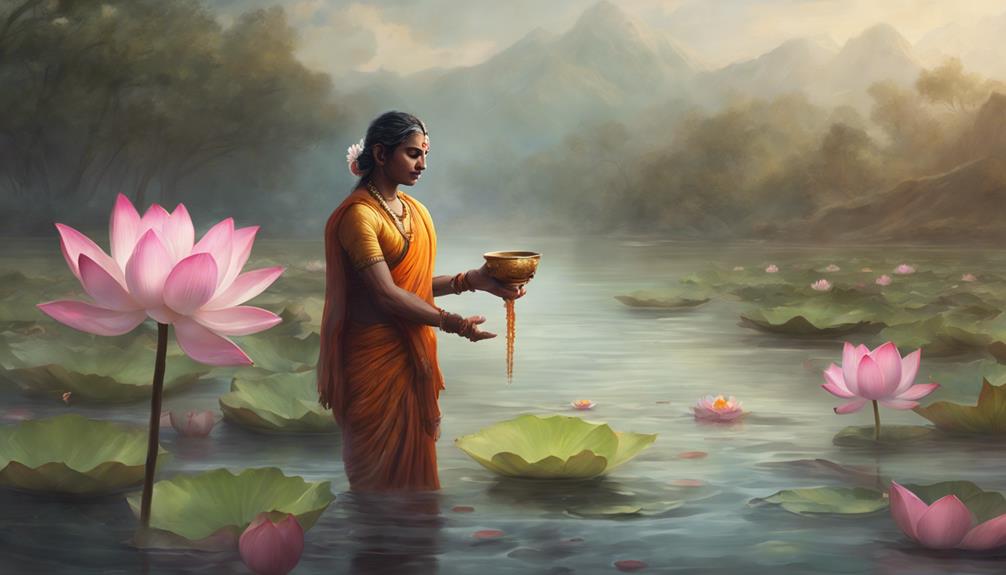
As you explore the symbolism of purification related to the River Ganga in Hindu mythology, you'll uncover the deep significance of cleansing rituals.
This symbolism goes beyond physical cleansing; it represents the purification of the soul and the attainment of spiritual purity.
The act of immersing oneself in the waters of the Ganga is believed to cleanse one of sins and impurities, symbolizing a rebirth and a fresh start.
Cleansing Ritual Symbolism
Symbolizing the journey from impurity to spiritual clarity, the cleansing rituals associated with the River Ganga in Hindu mythology hold profound significance. These ritualistic traditions are deeply rooted in the symbolic significance of purification.
Bathing in the sacred waters of the Ganga is believed to cleanse one of their sins and impurities, both physically and spiritually. The act of immersing oneself in the river's waters is seen as a symbolic gesture of letting go of past wrongdoings and starting anew with a cleansed soul.
The Ganga's purifying properties are thought to not only cleanse the body but also the mind and spirit, allowing individuals to seek spiritual purity and inner peace through these sacred rituals.
Spiritual Purity Representation
The essence of spiritual purity within Hindu mythology is intricately intertwined with the symbolic act of purification through the sacred rituals associated with the River Ganga.
In Hindu beliefs, the Ganga is revered for its ability to cleanse one's soul and purify them from sin. Purity rituals involving the Ganga often involve immersion in its waters, symbolizing the washing away of impurities and the renewal of the spirit.
The act of spiritual cleansing in the Ganga is seen as a way to rid oneself of negative karma and attain a higher state of being. This ritualistic purification process is deeply symbolic of the Hindu belief in the cycle of life, death, and rebirth, where spiritual purity is essential for achieving enlightenment.
Purification Through Ganga
In Hindu mythology, the purification process through the River Ganga embodies the profound symbolism of cleansing and spiritual renewal. Water purification holds a significant place in Hindu rituals, signifying the removal of impurities not just on a physical level but also on a spiritual plane.
The Ganga's waters are believed to possess purifying qualities that can wash away sins and grant spiritual cleansing to those who immerse themselves in it. This act of submerging in the sacred river represents a symbolic cleansing of one's soul, a renewal of spirit, and a fresh start on the path of righteousness.
The River Ganga, thus, isn't just a physical entity but a divine source of purification that aids in the spiritual evolution of individuals seeking inner enlightenment.
Ganga as a Goddess
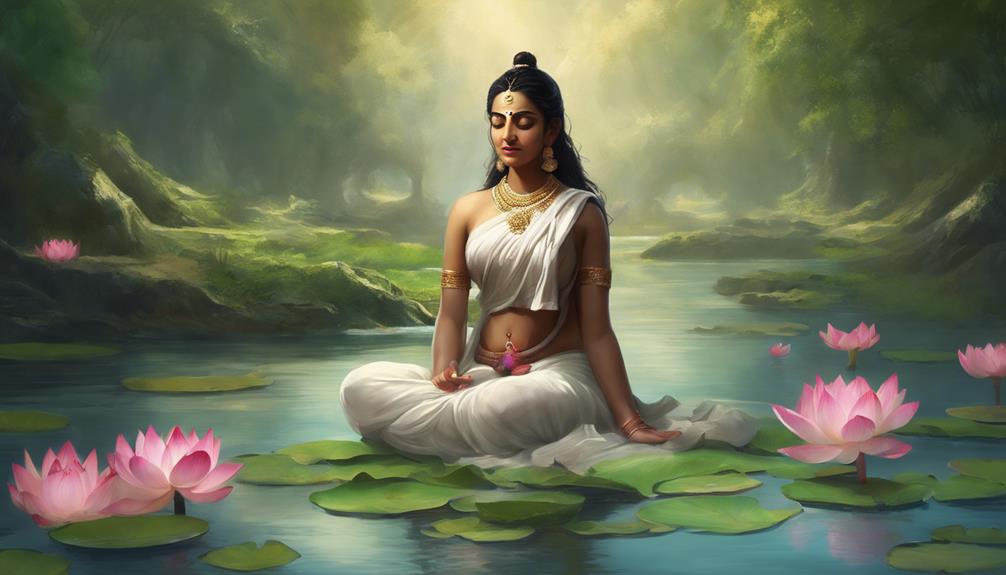
As a Goddess, Ganga embodies the divine origins of purity and sanctity, symbolizing the eternal flow of spiritual energy in Hindu mythology. Her presence signifies the purifying powers that cleanse the soul and wash away sins, offering believers a path to spiritual renewal and enlightenment through rituals and offerings.
Ganga's sacred symbolism transcends domain, representing the interconnectedness of the physical and spiritual domains in the eternal cycle of life, death, and rebirth.
Gangas Divine Origins
Emerging from the divine heavens, Ganga embodies the purity and sanctity revered in Hindu mythology. As a Goddess of divine descent, Ganga symbolizes spiritual significance in Hindu beliefs. She's seen as a manifestation of grace and compassion, flowing to cleanse the sins and impurities of mortals.
The descent of Ganga from the heavens to Earth represents the connection between the heavenly spheres and the mortal world, signifying the flow of spiritual energy and blessings. Hindus hold rituals and ceremonies to honor Ganga's divine origins, seeking her blessings for purification and spiritual growth.
The sacred waters of Ganga are believed to carry the essence of divinity, providing solace and spiritual upliftment to those who immerse themselves in her holy currents.
Gangas Purifying Powers
Ganga's divine essence, embodied as a Goddess, emanates purifying powers that cleanse the souls of believers seeking spiritual renewal. In Hindu mythology, the River Ganga symbolizes water purification and spiritual cleansing.
Bathing in the sacred waters of the Ganges is believed to wash away sins and impurities, allowing individuals to attain a state of purity and inner peace. The Goddess Ganga is revered for her ability to purify not just the body but also the mind and soul, offering worshippers a chance to start afresh and seek redemption.
The rituals performed along the banks of the Ganges are deeply symbolic, representing the continuous flow of life and the cyclical nature of purification, making Ganga a central figure in the spiritual journey of many devotees.
Gangas Sacred Symbolism
Symbolizing purity and spiritual rejuvenation, the Goddess Ganga embodies sacred symbolism in Hindu mythology, offering devotees a pathway to cleanse their souls and seek redemption through her divine essence.
Ganga, as a Goddess, represents the flow of life, the continuity of existence, and the cleansing of impurities. Her presence in Hindu rituals signifies the purification of sins and the liberation of the soul from the cycle of rebirth.
By immersing oneself in the waters of the Ganga, believers seek spiritual significance, aiming to wash away their earthly attachments and connect with higher domains of consciousness.
The river Ganga isn't merely water but a sacred embodiment of the divine, a source of strength, purity, and eternal grace in Hindu traditions.
Rituals and Ceremonies
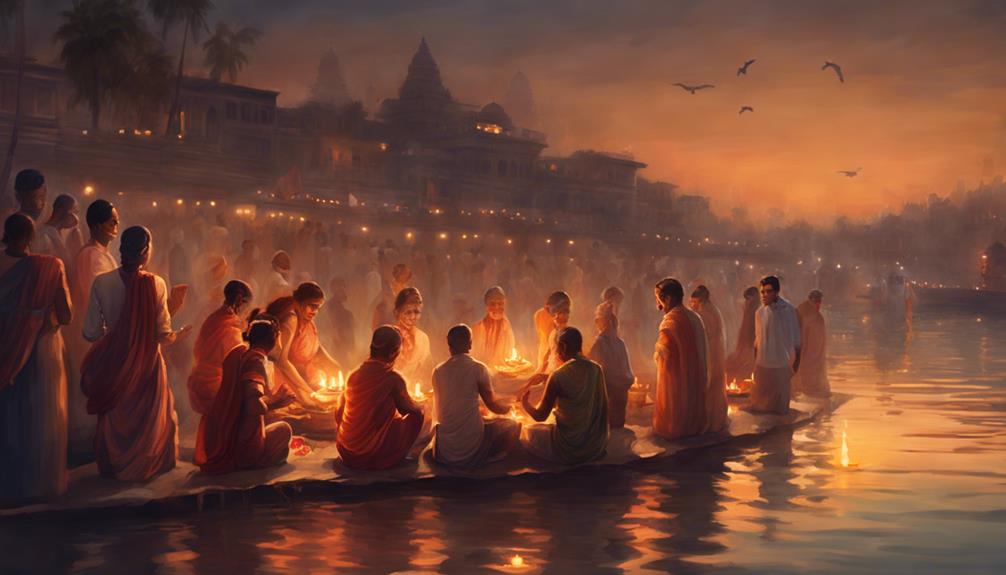
Have you ever wondered how rituals and ceremonies along the banks of the River Ganga play an important role in Hindu mythology and spiritual practices?
The River Ganga holds immense significance in Hindu rituals, particularly in the context of water purification and ceremonial traditions. Hindus believe that the waters of the Ganga are sacred and possess purifying qualities. It's common for people to immerse themselves in the river during religious ceremonies to cleanse themselves of sins and impurities, symbolizing a spiritual rebirth.
Ceremonies along the River Ganga are elaborate and steeped in tradition. From daily offerings of flowers and incense to grand festivals like Kumbh Mela, where millions gather to bathe in the holy waters, each ritual holds deep symbolic meaning. The act of releasing floating lamps onto the river during festivals signifies the dispersion of negativity and the illumination of one's inner self.
In Hindu mythology, the River Ganga isn't just a physical entity but a sacred embodiment of purity and spirituality, making the rituals and ceremonies performed along its banks an integral part of Hindu religious practices.
Spiritual Beliefs and Practices
Spiritual beliefs and practices in Hindu culture are deeply intertwined with the River Ganga, symbolizing purity and spiritual rejuvenation. The Ganga isn't just a physical river; it's also a metaphysical entity representing the flow of divine energy. Many Hindus believe that immersing themselves in the sacred waters of the Ganga can cleanse them of sins and impurities, both physically and spiritually. This act isn't just a ritual but a symbol of rebirth and renewal, reinforcing the interconnectedness of the physical and spiritual domains.
Meditative practices along the banks of the Ganga are believed to deepen one's spiritual connection and facilitate introspection. The tranquil flow of the river is often seen as a metaphor for the continuous flow of life, encouraging individuals to let go of attachments and embrace the impermanence of existence. By meditating on the riverbanks, Hindus seek to cultivate a sense of inner peace and connect with their higher selves, finding solace in the eternal presence of the Ganga's waters.
Historical and Cultural Influence

As you journey into the historical and cultural influence of the River Ganga, you'll uncover a tapestry of symbolism and interpretation.
From being revered as a purifier that cleanses the soul to inspiring art, literature, and music, the Ganga holds a profound significance in Hindu rituals.
Its presence in various festivals and ceremonies further solidifies its role as a sacred entity in the hearts of millions.
Ganga as Purifier
Flowing through the hearts of believers, the Ganga River washes away sins and impurities, symbolizing a profound spiritual cleansing in Hindu mythology and culture.
The sacred waters of the Ganga are believed to possess unique properties that purify both the body and soul of those who bathe in it.
This act of purification goes beyond physical cleanliness; it's a symbolic gesture of washing away one's past wrongdoings and starting anew.
The Ganga's role as a purifier is deeply ingrained in Hindu rituals and traditions, where devotees seek spiritual renewal by immersing themselves in its holy waters.
The concept of water purification in the Ganga represents a spiritual journey towards inner purity and liberation from negative karma, making it a central aspect of Hindu belief and practice.
Art and Literature
Influencing various forms of artistic expression and literary works, the River Ganga holds a profound historical and cultural significance in Hindu mythology.
Artists have long depicted the Ganga in various artistic interpretations, symbolizing purity, life, and divinity. Writers have explored the river's essence into literary symbolism, portraying it as a source of spiritual cleansing and renewal.
Through creative expressions, the Ganga has been depicted as a sacred entity that flows through the heart of Indian culture, inspiring countless narratives and poems.
Its cultural interpretations explore the river's role as a lifeline, connecting the physical and spiritual domains. The Ganga's presence in art and literature reflects its enduring importance in Hindu beliefs and practices.
Festivals and Rituals
Celebrated with fervor and reverence, festivals and rituals deeply rooted in history and culture pay homage to the River Ganga's sacred essence in Hindu tradition.
The festive celebrations surrounding the River Ganga, such as the Kumbh Mela, reflect the belief in the river's purifying properties. During these events, millions of devotees gather to bathe in the Ganga, seeking spiritual cleansing and renewal.
Ritualistic practices like offering flowers, incense, and lamps to the river are common, symbolizing devotion and gratitude. The act of immersing oneself in the Ganga's waters is believed to wash away sins and facilitate moksha, liberation from the cycle of rebirth.
These festivals and rituals serve as a powerful reminder of the River Ganga's significance in Hindu mythology and spiritual life.
Sacred Cities Along Ganga
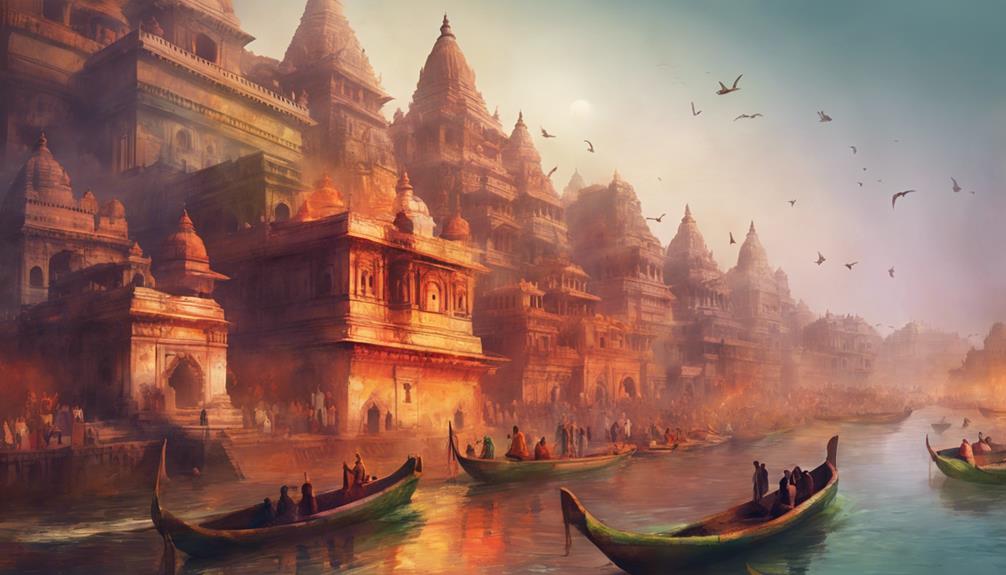
Nestled along the banks of the sacred River Ganga lie cities that pulsate with spiritual energy and cultural significance in Hindu mythology. These cities, such as Varanasi, Haridwar, and Rishikesh, aren't merely physical locations but are considered sacred pilgrimage sites where devotees seek spiritual enlightenment and purification. The cultural heritage of these cities runs deep, with each corner echoing stories of ancient traditions and rituals.
Varanasi, also known as Kashi, is one of the oldest continuously inhabited cities in the world. It's believed that a journey to Varanasi and taking a dip in the Ganges can wash away one's sins and lead to salvation. Haridwar, another city along the Ganga, is where the river leaves the mountains and enters the plains. Pilgrims flock to Haridwar to participate in the Ganga Aarti, a mesmerizing ritual of offering prayers to the river. Rishikesh, known as the Yoga Capital of the World, is a serene town where seekers come to meditate, practice yoga, and explore spiritual teachings by the river's tranquil banks.
These cities serve as more than just physical locations; they're symbolic representations of the eternal flow of life, the cycle of birth and rebirth, and the divine connection between humans and the sacred River Ganga.
Environmental and Social Impact
The interaction between the sacred cities along the Ganga and the environmental and social impact they embody reveals a profound connection between spiritual practices and the preservation of natural resources. The River Ganga, considered sacred in Hindu mythology, holds immense significance not only in religious contexts but also in environmental conservation and social responsibility. The continuous water pollution challenges along the Ganges emphasize the need for collective action to protect this essential natural resource. Initiatives focusing on environmental conservation are intertwined with the religious practices that revere the Ganga, reflecting a holistic approach to stewardship.
Moreover, the cultural preservation efforts in the regions along the Ganges play a significant role in maintaining the heritage and traditions associated with the river. By recognizing the cultural significance of the Ganga, communities are encouraged to uphold social responsibility and safeguard the environment. Through a harmonious blend of spiritual devotion, environmental awareness, and cultural preservation, the Ganga symbolizes a profound connection between humanity and nature, emphasizing the importance of sustainable practices for future generations.
Continued Reverence and Devotion
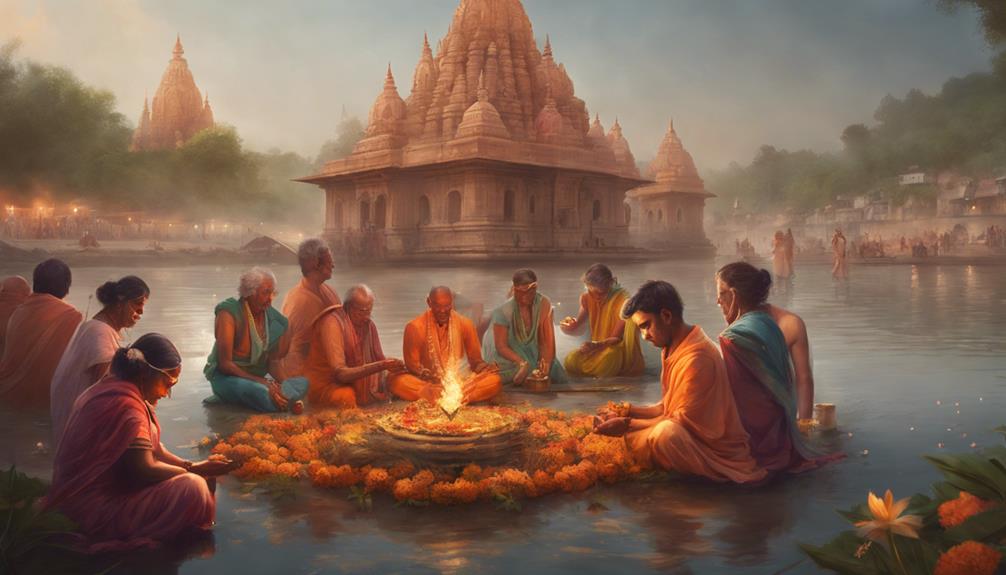
Why does the River Ganga continue to hold a place of profound significance in the hearts and minds of those who revere its waters in Hindu mythology? The River Ganga symbolizes purity and divinity, making it a focal point of devotional practices for millions of Hindus. Its cultural significance is deeply rooted in stories of gods and goddesses, with its waters believed to cleanse sins and grant moksha, liberation from the cycle of rebirth. Pilgrimages to the Ganga are considered essential for spiritual growth, with rituals like aarti ceremonies performed daily to honor its sacred nature.
Modern interpretations of the Ganga's significance also highlight environmental concerns. As pollution threatens the river's purity, there's a growing movement to protect and preserve its waters. Despite these challenges, the devotion towards the Ganga remains unwavering, with efforts to clean the river reflecting a deep-seated reverence for this lifeline of spiritual and cultural importance. The River Ganga serves as a proof of the enduring connection between faith, tradition, and the natural world.
Frequently Asked Questions
How Has the Depiction of Ganga in Hindu Mythology Influenced Modern-Day Artistic Representations of the River?
When exploring artistic interpretations of the River Ganga influenced by Hindu mythology, you'll find a rich tapestry of cultural influences. Its symbolism and inspiration have shaped modern-day representations, infusing them with depth and ritual significance.
Are There Any Lesser-Known Rituals or Ceremonies Associated With the Worship of Ganga That Are Not Commonly Practiced Today?
You have forgotten rituals and ceremonial practices linked to Ganga worship. Explore ancient traditions like Vedic yajnas dedicated to the river, symbolic offerings, and meditative rituals. Revisit these lesser-known customs for deeper spiritual connections.
How Has the Environmental Degradation of the Ganga River Affected the Spiritual Beliefs and Practices of Its Devotees?
When the Ganga river faces environmental degradation, devotees' spiritual beliefs and practices are impacted. The loss of purity in the sacred waters raises environmental awareness and challenges the cultural significance of rituals.
What Role Does Ganga Play in the Daily Lives of Individuals Living in the Sacred Cities Along Its Banks?
In your daily life along the Ganga, the river's purification rituals bring spiritual cleansing. Embracing sustainable practices for environmental conservation reflects reverence for Ganga's sanctity, intertwining spiritual beliefs with practical actions for a harmonious existence.
Are There Any Specific Social Initiatives or Movements Dedicated to Preserving the Purity and Sanctity of the Ganga River in Contemporary Times?
In contemporary times, various social initiatives and movements are dedicated to preserving the purity of the Ganga. Environmental activism and community engagement play pivotal roles alongside government policies in safeguarding this cultural heritage, ensuring the river's sanctity.
Conclusion
To sum up, the river Ganga holds immense significance in Hindu mythology as a symbol of purification and divinity. Its mythological stories, rituals, and cultural influence have shaped the spiritual practices of millions of people.
By honoring and protecting the Ganga, Hindus continue to show reverence and devotion to this sacred river, recognizing its environmental and social impact on their lives and the world around them.
The Ganga remains a crucial aspect of Hindu symbolism, interpretation, and rituals.